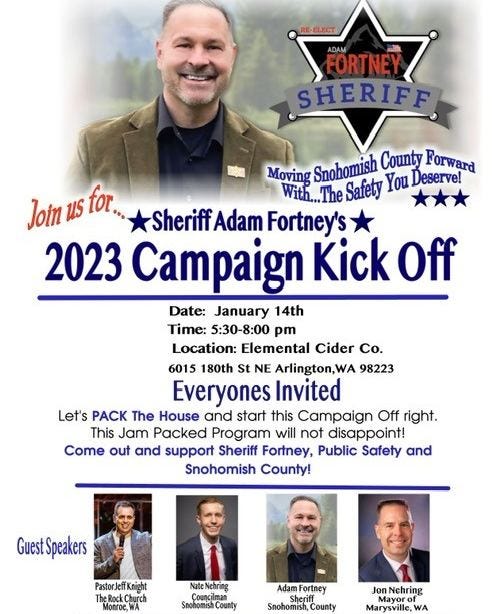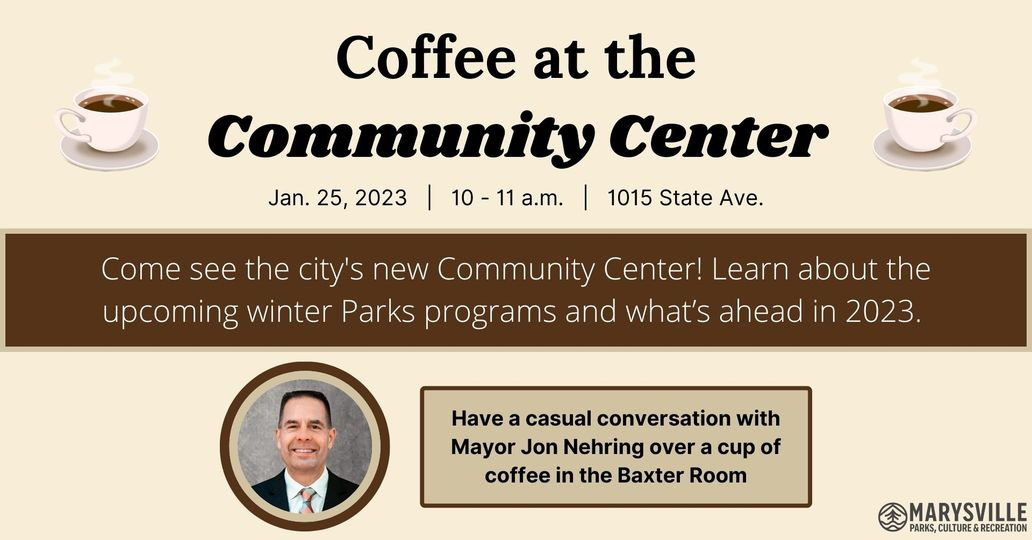There as only been one previous issue of the Sun to come out on a Friday the 13th, which happened to be the very first one. But here’s the second, in the second week of 2023. Enjoy the love, including an article about this past Wednesday’s revitalizing downtown Marysville meeting by a guest contributor.
☀️The Sun on Churches
I mentioned in the year-end issue that we aim for the Sun to shine more on Marysville churches. By “we” I specifically mean having Maggie Rothenberger contact various pastors and see if they’d be willing to share some of their vision for serving Christ in our city.
It would be easy to start with the church I attend. For those just joining us, I am one of the pastors there; shepherding is more than my side-hustle. Mrs. Rothenberger thought it would be good to start with our church, but that was really what I did not want to do. As editor, I do not see the Sun as some sort of surreptitious marketing platform for the various things I’m already involved in, though, of course, I do naturally know more about the things closer at hand. Anyway, as we talked and as we came up with some starter questions for other churches, I thought I’d take today’s article to introduce the why.
Highlighting some of the churches in Marysville is relevant to blessing Marysville because, by God’s grace, the churches have a higher mission than Marysville. What I mean is that the joy of a Christian doesn’t depend only on circumstances, on having a certain political party in office, or having dependable law enforcement, or having schools that are committed to teaching boys and girls, in only those categories, respectively and respectfully. Good works hope for visible results, but our motivation for doing good isn’t limited to temporal success. The churches in our city love our neighbors not necessarily because our neighbors are lovely, but because God loved and loves us and calls us to love others as He loved us.
Any given church might not be faithful to the Great Commission. Identifying as a “church” doesn’t make a group a church; a church is defined in the Bible as a place where the Word of God is taught, the ordinances (baptism and communion) of Christ celebrated, and church discipline practiced. There are all kinds of problems in and with churches, but in general, they are Christians committed together to cultivating local roots for eternal purposes.
Local churches are uniquely suited to bless their cities, and that over the long haul. Denominations and networks may have their place, national conferences and seminars can be profitable, but the week in, week out work of disciples, who are fed and blessed each Sunday as they assemble for worship, will make their burgs better.
One of the phrases that I’ve used in previous Sun articles is “loving into greater loveliness.” This is one angle on the gospel of Jesus Christ. We all, or at least many, know that “God so loved the world that He gave His only begotten Son, so that all those believing in Him will not perish but will have everlasting life” (John 3:16). The apostle Paul wrote, “God shows his love for us in that while we were still sinners, Christ died for us” (Romans 5:8). So God’s love for the unlovely—a reference to those disobedient to His law—motivated the sending and sacrifice of Jesus on the cross in order to forgive and transform those who believe.
Churches are the pillar and ground of this truth about Jesus Christ our Lord and Savior (1 Timothy 3:15-16). As we believe in Christ, we learn to obey Him and imitate Him. Jesus taught that we must even love our enemies (Matthew 5:43-47), and that love is powerful by God’s grace to bring about greater loveliness (which assumes that love is not just affirming whatever they already think). Loving into splendor is what Jesus is doing for His Bride, the Church (Ephesians 5:25-27).
In a similar way, Paul instructed slaves to “adorn the doctrine of God our Savior” (Titus 2:10). The truth is already good, but there is a way we can embody and even beautify it in our behavior. This is what churches equip their people to do.
Churches are not primarily about politics, but as churches worship the holy and gracious God, Christians learn to love what God loves, which includes righteousness and justice on earth. As they have opportunity, why wouldn’t Christians care about laws and law enforcement, and voting for others who also care? The same perspective applies to business, property development, art, education, to all of life under the sun. Jesus is the Creator of all things, He sustains His creation, so Christians increase their interests and stewardship of all His things in Jesus’ name.
Some churches may have a particular emphasis, whether part of their doctrine or part of their strategy to bless their neighbors. We want to give pastors the opportunity to describe their ministries and give glory to God for His blessings of fruit through their congregations.
Churches used to be built in the center of town, they were centers of life. While it may not be that way on a map of Marysville, our churches are as necessary as ever to be the salt of the earth and the light of the world.
☀️Trinitarian Design - An Approach to Urban Planning
by Philip Kulishov
[Editor’s note: Mr. Kulishov is a husband, father of three, local business owner, and sometimes blogger. See more at his own about page and/or follow him on Twitter.]
While the train chugged along the tracks past 4th and Cedar - following its disruptive, yet predictable, routine - just under 100 Marysvillians gathered inside the century-old Opera House to hear city officials present their concepts for revitalizing downtown. The presentations covered city development, infrastructure investments, waterfront expansion plans, and interchange improvements, among other things. Of course, the meeting was not short of your usual hecklers - also known as C.A.V.E. people (Citizens Against Virtually Everything). But they are our hecklers. We all need some excitement in our lives. The city officials were more than gracious in their responses, welcoming the feedback.
The main takeaway of the event is not one to trigger a “Breaking News” alert: Marysville is growing, whether we like it or not. This is first-hand knowledge. We’re all victims of heavier congestion up and down State Ave. Parking near downtown is not as seamless as it once was. Marysville is growing. And growth, in any environment, is disruptive. Heck, maybe being a heckler is a viable option. Opportunities abound. It’s a hot market. Demand for heckling is on the rise.
A growing city is nothing new. And planning for that growth is prudent. However, there was a specific point that triggered my immediate attention - something worthy of contemplation. Mayor Nehring introduced a question in his opening remarks, that then was repeated by a few of the other presenters. The question was left for the community to answer. Before inviting the first presenter, Mayor Nehring asked the audience, “What is Marysville’s identity?” The Mayor revealed that this is a question he’s received, and used along with his staff to guide their work on the future cityscape. What is the identity of Marysville? And how should that identity guide the city’s development?
This is a good question. It’s a question that hits at the center of urban planning and city design. Like most things, it’s not a question that can be answered by government imposition. It’s a question that finds its answer in the organic springs of life within. What is a city if not a group of people living and interacting together. A city is not a book of codes, a connection of roads, or a government institution. And neither is a city a group of self-sufficient individuals, devoid of any need for community. A city is a community of Trinitarian image-bearers. A city is a Trinitarian community.
To understand the identity of Marysville, we must understand the identity of its constituents. People, as image-bearers of the Triune God, are created for relationship. We’re not meant to be left in isolation. We’re designed to be in community. But the kind of community that resembles our Maker is more than transactional. Sure, we sign contracts and make deals. We shake each other’s hands and collect payment for our services. We attend a city presentation meeting and barrage the speakers with questions. But the basis of a Trinitarian Community is not a transaction, but love.
God is love. And, He was love before He ever invited mankind into it. He is love within Himself. The Trinity is community. The Trinity is relationship. The Trinity is love. Being created in the image of God means that we are created to love.
So, what would it look like if the design for downtown was guided by our identity of being a Trinitarian community? What would it look like if our urban plan was meant to stimulate relationships that encompass our lives? What would it look like to be motivated by love?
The idea of love has been hijacked in our day. It’s associated with sentimentality and mere approval. But that’s not what I mean when referring to living in community motivated by love. Cultivating a Trinitarian community in Marysville means living our lives in tangent with one another with a desire to bless our neighbors. Our neighbor’s life is not marginalized. And neither is ours. Our lives encompass work, sleep, and recreation. Wouldn’t it only make sense for an urban scape - with lives lived in tangent - to include encompassing opportunities?
We’d design buildings that stimulate community. We’d create attractions to build relationships. We’d erect a public square where citizens could assemble together with joy and gladness. As Winston Churchill once said, “We shape our buildings, and afterwards our buildings shape us.”
Sure, parking could be a problem with too much going on in the city. Attractions increase traffic flow. The concerned citizens have a point. But maybe, just maybe, then we’d walk more. And perhaps while walking to our destination, we’d enter the Hilton & Company Store on 3rd Street and have a few words with Mary Kirkland, while we buy a couple gifts for our kids. Maybe we’d stop by 5 Rights Brewing along the way and enjoy a beer while RJ makes his rounds greeting guests at the tables. Maybe we’d be tempted with a fresh-baked treat from the Dutch Bakery across the street. Or maybe, there will be businesses in the vibrant downtown that haven’t been established yet, by people who haven’t yet moved in. A Trinitarian Community is one that lives life together.
What is the identity of Marysville? Marysville is a Trinitarian community - from a small town, to a growing city. But the Mayor’s question is not answered with words, plans, or buildings. It’s answered by how the people of our city build their lives together.
☀️Events to Attend
Sheriff Fortney campaign Kick Off, Saturday, January 14, 5:30-8:00pm at Elemental Cider - 6015 180th St NE, Arlington. See his invitation on Facebook here.
Coffee with Mayor Nehring, Wednesday, January 25, 10:00-11:00am in The Baxter Room at the new Marysville Community Center - 1015 State Ave. See the event page on the city’s Facebook here.
State of the City with Mayor Nehring, Wednesday, February 1, 6:30pm at the Marysville Civic Center.

☀️Friday Fun
Look again. And again.

Marysville Sun Archive | Email the Editor | Facebook | Twitter






